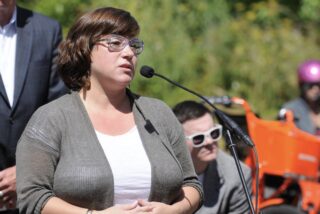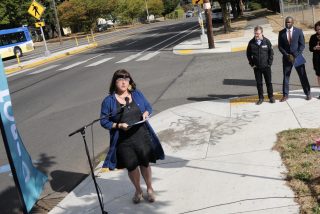
(Photos: Jonathan Maus/BikePortland)
City Commissioner Chloe Eudaly is on the agenda of the Portland Bicycle Advisory Committee (BAC) Tuesday night. It will be the final time the BAC hears from the commissioner-in-charge of the transportation bureau and an opportunity for her to cement a legacy. When it comes to cycling, many of us will likely recall a tenure that delivered a lot of promise and solid progress on key issues, but missed out on cycling-specific opportunities.
Here’s a look back at Eudaly’s time as transportation commissioner.
Despite being seated as commissioner in January 2017, Eudaly wasn’t given the Bureau of Transportation (PBOT) portfolio by Mayor Ted Wheeler until August 2018. That gave a political newcomer just over two years to steer the PBOT ship, a rather large vessel with over 1,000 employees and an annual budget of $570 million. PBOT is one of the most difficult agencies to oversee not just because of its size, but because how we get around intersects with so many other controversial and emotionally fraught issues such as racism, policing, income/geographic equity, and an entrenched resistance to change the driving-centric status quo. Eudaly also took the helm of PBOT at a time when the transportation issue carried much less political heft than in past eras.
Given this context, Eudaly handled the assignment well. She (and her Chief of Staff Marshall Runkel and Policy Director Jamey Duhamel) plunged into the topic head-first by participating in the widely-respected Portland Traffic and Transportation class at Portland State University. Eudaly also proved early on that just because she didn’t have a deep transportation policy background, she would not be afraid to go up against those who did.
When challenged by a BikePortland reader about her commitment to the issue, she came right into our comments section to defend herself. And months before her runoff election with former U.S. Senate candidate and commissioner Steve Novick, Eudaly successfully pressured him on the issue of making adaptive bikes available as part of Portland’s Biketown bike share system.
Advertisement

Once armed with the confidence and knowledge about how transportation works, Eudaly spoke clearly to Portlanders about the harmful impacts single-occupancy vehicle abuse has on our system and the urgent need to reduce it. In contrast to a transportation agency too often saddled by fear of hurting drivers’ feelings, Eudaly’s candor was important and refreshing. In a May 2019 I shared, “If PBOT is ever going to start riding faster, they need someone like Commissioner Eudaly out front to provide a draft.”
Eudaly was unafraid to oppose the I-5 Rose Quarter project, even though PBOT had spent years cozying up to the Oregon Department of Transportation as a close partner. Eudaly’s concerns about the project grew over time and ultimately led her to take the historic, unprecedented step of withdrawing PBOT’s federal partnership back in October.
That opposition to the Rose Quarter project will outlive Eudaly’s tenure at City Hall. So too will her work on the Rose Lane Project, an effort launched last year to speed up buses with dedicated lanes and other methods.
Eudaly’s bus policies were centered on lowering greenhouse gas emissions and raising the quality of transit service for Black, indigenous, and people of color. Climate change was an obvious way to frame transit upgrades; but Eudaly and her team (led by Policy Director Jamey Duhamel) gave race-specific outcomes a surprisingly powerful role in shaping the policy. That move, based on a burgeoning mobility/transportation justice movement, would prove prescient and appropriate as it came months before local protests erupted after George Floyd was killed by a police officer in Minneapolis.
Advertisement

Climate change and racial equity are pillars of the Rose Lane Project, and they’ve now become enshrined as official PBOT policy more broadly. The agency’s 2019-2022 Strategic Plan includes two questions PBOT is “always asking”: “Will it advance equity and address structural racism?” and “Will it reduce carbon emissions?”. Those questions became more than empty rhetoric when staff used them to decide against bike lanes on Hawthorne Blvd in a preliminary analysis released in September 2020.
With racial equity and climate change now ahead of Vision Zero as PBOT’s top priority, the Rose Lane Project off-and-running, and buoyed by a rally for the 2030 Bike Plan, Eudaly’s office was ready to focus on cycling in early February this year. The plan was to have a “Council Bike Moment” this past spring at City Hall with Eudaly and her policy staff arm-in-arm with PBOT’s top brass. The agenda included the release of three documents that could help spur the cycling renaissance Portland so desperately needs: a report on the Bicycle Plan for 2030, a report on Portland’s neighborhood greenway network (released last month), and the release of a protected bikeway design guide (which was released in draft form in 2018 but has since vanished).
Then the pandemic hit.
Biking’s big day at City Hall was called off and rescheduled for late October.
As the new Council Bike Moment date approached, Duhamel told the PBOT Bike Advisory Committee it wasn’t ready and needed to be delayed again until spring 2021. Eudaly’s office and PBOT staff wanted the presentation at council to demonstrate work they’d done on racial equity and cycling; but they felt not enough progress had been made. “We made the decision to take the time that is needed, rather than invite BIPOC cyclists to a preset table and risk tokenizing their participation, something that feels more like a show,” Duhamel explained. (I’ll share more on this in a separate post.)
Race has played a huge role in Eudaly’s short political life — especially as it relates to transportation: She faced the complexities and opportunities of race in the Council Bike Moment example above; she oversaw PBOT as it embarked on being an antiracist organization; she made race a central pillar of the Rose Lane Project; racial equity concerns loomed over her delayed decision to create “open streets” when the pandemic hit; it influenced plans for a “Black Lives Matter” street mural; and her striking evolution on the role of police officers in traffic enforcement has everything to do with her own racial reckoning.
Eudaly’s candid, courageous, clear, and policy-driven style through these daunting last two years earned her considerable support in local transportation and cycling advocacy spheres. In the end however, she didn’t do enough to win re-election.
Much like the era Eudaly governed through was complicated, so too remains her legacy. The decision to visit the bike committee Tuesday night shows Eudaly is proud of it. She should be, even though the people around the table never got the big moment they hoped for.
You can attend Tuesday night’s BAC meeting via Zoom. It starts at 6:00. Details here.
— Jonathan Maus: (503) 706-8804, @jonathan_maus on Twitter and jonathan@bikeportland.org
— Get our headlines delivered to your inbox.
— Support this independent community media outlet with a one-time contribution or monthly subscription.

